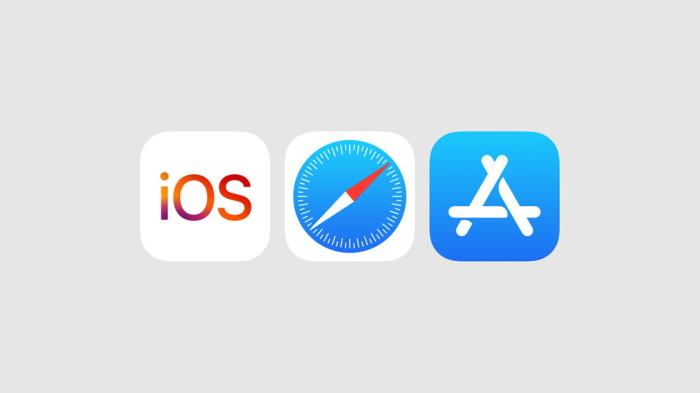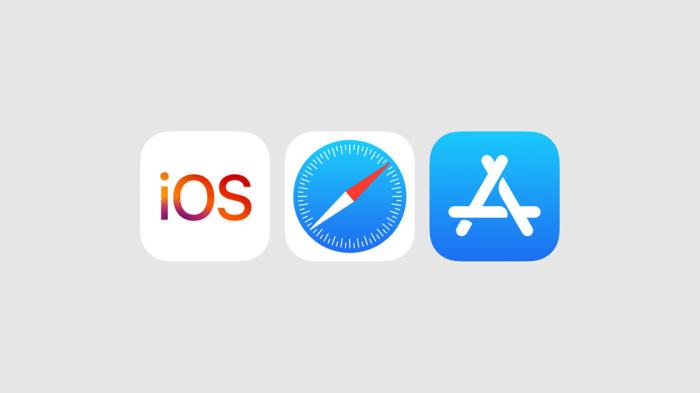Apple EU App Store changes are shaking up the app world, bringing new opportunities and challenges for developers and consumers alike. The European Union, concerned about Apple’s control over the App Store, has implemented regulations that aim to promote competition and user choice.
This shift could drastically alter the way we access and pay for apps, and the ripples are likely to be felt globally.
At the heart of the changes is the concept of sideloading, allowing users to install apps from sources outside the official App Store. This opens the door to alternative app stores and could empower developers to reach users directly, bypassing Apple’s stringent guidelines and hefty commission fees.
The implications are far-reaching, with potential benefits for developers, consumers, and even the future of mobile ecosystems.
EU App Store Changes: A New Era for App Developers?
The European Union (EU) has announced significant changes to the App Store, impacting Apple’s business model and potentially opening up new opportunities for app developers. These changes, driven by concerns regarding Apple’s dominance in the mobile app market and its perceived anti-competitive practices, aim to create a more open and competitive app ecosystem.
Motivation Behind the Changes
The EU’s primary concern is that Apple’s App Store operates as a closed system, restricting developers’ ability to reach users and potentially limiting consumer choice. The EU believes that Apple’s control over the App Store has resulted in:
- High Commission Fees:Apple’s 30% commission on in-app purchases has been criticized for being excessive and limiting developers’ revenue potential. This fee, known as the “Apple Tax,” has been a major point of contention.
- Limited App Distribution Options:Developers are currently required to distribute their apps through the App Store, with limited alternatives. This restricts developers’ ability to reach users directly and potentially negotiate better terms.
- Restrictive App Store Policies:Apple’s stringent App Store guidelines have been criticized for being overly restrictive and hindering innovation. These guidelines have been accused of stifling competition and limiting user access to alternative app stores.
Impact on Apple’s Business Model
The EU’s App Store changes could significantly impact Apple’s business model and revenue streams. These changes could lead to:
- Reduced App Store Revenue:The reduction in commission fees could directly impact Apple’s revenue from in-app purchases, a significant portion of its App Store earnings.
- Increased Competition:The potential for alternative app stores to emerge could erode Apple’s market share and reduce its dominance in the mobile app ecosystem.
- Pressure on Apple’s Services Business:The changes could put pressure on Apple’s overall services business, which includes the App Store, Apple Music, and iCloud. This could impact Apple’s revenue growth and profitability.
Potential Benefits for App Developers
The EU’s App Store changes could offer several benefits for app developers:
- Increased Revenue:Lower commission fees could significantly increase developers’ revenue potential, allowing them to invest more in app development and marketing.
- Greater Distribution Options:The possibility of alternative app stores could provide developers with more distribution channels, potentially reaching a wider audience.
- More Flexibility:The potential for relaxed App Store guidelines could give developers more flexibility in app development and design, allowing them to experiment with new features and ideas.
Sideloading and Alternative App Stores
The EU’s new regulations aim to increase competition and choice in the app market, potentially impacting how we download and use apps on iOS devices. A key aspect of these changes is the introduction of sideloading and the possibility of alternative app stores.
Sideloading: A New Way to Install Apps
Sideloading refers to the process of installing apps directly onto a device without using the official app store. Traditionally, iOS devices have relied on the App Store for app distribution, but sideloading opens up new avenues for obtaining apps. The potential benefits of sideloading include:
- Greater Choice:Users can access apps that may not be available on the App Store, including open-source apps, older versions, or apps from smaller developers.
- More Control:Users have more control over their device and can choose where they want to download apps from.
- Potential Cost Savings:Sideloading could allow users to access apps without paying the App Store’s commission fees, potentially leading to lower prices.
However, sideloading also presents several challenges:
- Security Risks:Installing apps from untrusted sources can expose users to malware and security vulnerabilities. Sideloading bypasses the App Store’s security checks, which are designed to protect users from malicious apps.
- Compatibility Issues:Apps downloaded through sideloading might not be compatible with the device’s operating system or may not work properly. The App Store ensures compatibility and provides a smooth user experience.
- User Experience:Sideloading requires technical knowledge and may be less user-friendly compared to the App Store’s streamlined process. Users might need to manually manage app updates and configurations.
Alternative App Stores: A Shift in the Ecosystem
The EU regulations also encourage the emergence of alternative app stores on iOS. These stores could offer a different selection of apps, pricing models, or user experiences. The potential benefits of alternative app stores include:
- Increased Competition:Alternative app stores can challenge the App Store’s dominance and provide developers with more options for distribution. This could lead to lower prices and more innovation.
- New Business Models:Alternative app stores might experiment with different revenue models, such as subscription services or advertising, providing developers with more flexibility.
- Specialized Content:Alternative app stores could cater to specific niches or interests, offering curated collections of apps that appeal to a particular audience.
However, alternative app stores also face challenges:
- User Adoption:Alternative app stores need to attract a large user base to be successful. Users may be reluctant to switch from the established App Store, which has a vast library of apps and a familiar interface.
- Security and Trust:Alternative app stores need to establish a reputation for security and reliability. Users must trust that the apps they download are safe and legitimate. The App Store has a well-established security system and brand recognition.
- Discovery and Promotion:Alternative app stores need to find ways to promote their apps and make them easily discoverable. The App Store has a sophisticated search and discovery system, making it challenging for alternative stores to compete.
In-App Purchases and Payment Options
The EU’s new regulations are set to significantly impact the way developers monetize their apps within the App Store, particularly regarding in-app purchases and payment options. The regulations aim to provide developers with more freedom and flexibility in how they manage their transactions, challenging Apple’s existing system and its control over the App Store ecosystem.
Impact of EU Regulations on Apple’s Commission Fees
The EU’s regulations will force Apple to allow developers to use alternative payment systems for in-app purchases, effectively reducing Apple’s dominance in the payment processing landscape. Currently, Apple charges a commission of 15-30% on all in-app purchases made through its own payment system.
This means developers have to pay a significant portion of their revenue to Apple, limiting their profits and potentially hindering their ability to invest in app development and innovation.The new regulations are expected to reduce Apple’s commission fees, as developers will have the option to use alternative payment methods with lower fees.
This could lead to a more competitive pricing landscape for developers, allowing them to keep a larger share of their revenue and potentially offer lower prices to users.
Potential Alternative Payment Methods
Developers may choose to adopt various alternative payment methods in response to the EU’s regulations, aiming to reduce their reliance on Apple’s payment system and its associated fees. Some potential options include:
- Direct Integration with Payment Processors:Developers could directly integrate with established payment processors like Stripe or PayPal, enabling users to make in-app purchases without going through Apple’s system. This would allow developers to keep a larger portion of their revenue, as they would only have to pay the processing fees charged by the chosen payment processor.
- Alternative App Stores:Developers might opt to distribute their apps through alternative app stores, such as the Amazon Appstore or the F-Droid repository for Android apps. These alternative app stores often have lower commission fees or even no fees at all, providing developers with a more lucrative revenue stream.
- Subscription Models:Developers could implement subscription models for their apps, offering users access to premium features or content in exchange for recurring payments. This would allow developers to generate recurring revenue streams and potentially reduce their reliance on one-time in-app purchases.
It’s important to note that adopting alternative payment methods might come with challenges, such as navigating different payment systems and potentially dealing with increased complexity in managing transactions. Additionally, developers will need to carefully consider the user experience and ensure a seamless transition for users who are accustomed to Apple’s existing payment system.
Impact on App Developers and Consumers: Apple Eu App Store Changes
The EU’s App Store changes are poised to significantly reshape the app development landscape and influence consumer choices. This shift promises both opportunities and challenges for app developers and consumers alike.
Impact on App Developers
The changes introduce a new era for app developers, offering greater freedom and control over their apps and distribution channels.
- Increased Competition:Developers can now distribute their apps through alternative app stores, potentially reaching a wider audience and fostering greater competition within the app market. This can lead to more innovative apps and potentially lower prices for consumers. For example, a developer might choose to distribute their app through a smaller, niche app store that caters to a specific user base, increasing their visibility and potential for success.
- Greater Control:Developers have the option to use alternative payment systems for in-app purchases, potentially reducing the fees they currently pay to app store platforms. This can lead to higher profits for developers, allowing them to invest more in app development and offer more features or lower prices.
For example, a game developer could choose to implement a direct payment system within their app, bypassing the platform’s fee and potentially increasing their revenue.
- Direct User Relationships:Developers can establish more direct relationships with their users, potentially leading to better communication, personalized experiences, and more effective marketing. This can foster greater user loyalty and engagement, as developers can tailor their apps and communications to meet the specific needs of their user base.
However, the changes also pose challenges for developers:
- Increased Costs:Developers might need to invest in new technologies or infrastructure to support alternative distribution channels and payment systems. This could be particularly challenging for smaller developers with limited resources. For example, a developer might need to create a new website or app to manage their own distribution and payment processing, which can be costly and time-consuming.
- Marketing and Discovery:Reaching users on alternative app stores can be more difficult, as they might lack the visibility and reach of established platforms. Developers might need to invest more in marketing and promotion to reach their target audience. For example, a developer distributing their app through a smaller app store might need to employ more targeted marketing strategies, such as social media campaigns or influencer partnerships, to reach potential users.
- User Fragmentation:With the emergence of multiple app stores, developers might face challenges in managing app updates and user support across different platforms. This could lead to a fragmented user experience and potentially increase development costs. For example, a developer might need to create separate versions of their app for different app stores, potentially increasing development time and resources.
For descriptions on additional topics like startups mission upgrade irelands meagre ev charging network, please visit the available startups mission upgrade irelands meagre ev charging network.
Impact on Consumers
The EU’s changes are expected to empower consumers by offering greater choice and control over the apps they use.
- Wider App Selection:Consumers will have access to a wider range of apps from different sources, potentially leading to more diverse and innovative app experiences. This could create opportunities for smaller app developers to reach a wider audience and offer niche apps that cater to specific user needs.
- Lower Prices:Competition among app stores and alternative payment systems could lead to lower prices for apps and in-app purchases. This could make apps more accessible to a broader range of consumers, particularly those with limited budgets.
- Enhanced Privacy:The changes could lead to greater transparency and control over personal data collected by apps. Consumers might have more options to choose how their data is used and shared, potentially leading to a more privacy-conscious app ecosystem.
However, the changes also present potential challenges for consumers:
- App Quality Concerns:The emergence of alternative app stores might lead to concerns about app quality and security. Consumers might need to be more discerning when choosing apps from unfamiliar sources, as there could be a higher risk of malware or other security threats.
- Fragmentation and Compatibility:Consumers might need to navigate multiple app stores and potentially deal with compatibility issues between apps from different sources. This could lead to a more fragmented app experience and potentially increase the complexity of managing apps on their devices.
- User Interface Inconsistencies:Different app stores might have varying user interfaces and navigation methods, potentially creating a less consistent and intuitive experience for consumers. This could require consumers to adapt to different interfaces and potentially increase the learning curve for using new apps.
Apple’s Response and Future Implications
Apple’s official response to the EU’s App Store regulations has been a mix of compliance and resistance. While the company has acknowledged the need to adapt to the new rules, it has also expressed concerns about the potential impact on its business model and the user experience.
This response has set the stage for a complex legal and economic landscape that will shape the future of the mobile app ecosystem.
Potential Legal Challenges and Negotiations
The EU’s App Store regulations present several potential legal challenges for Apple. The company might argue that the new rules violate its intellectual property rights, interfere with its ability to control its platform, or create an uneven playing field for app developers.
Apple could also challenge the regulations based on their impact on user privacy and security. Negotiations between Apple and the EU are likely to be intense, with both sides seeking to protect their interests. Apple may try to negotiate exemptions or clarifications to the regulations, aiming to minimize the impact on its business model.
The EU, however, is likely to remain firm in its commitment to promoting competition and consumer choice.
Long-Term Implications for the Mobile App Ecosystem
The EU’s App Store regulations could have significant long-term implications for the mobile app ecosystem. The most immediate impact will be on app developers, who will gain more flexibility in choosing payment systems and distribution channels. This could lead to increased competition in the app market, potentially benefiting consumers with lower prices and more choices.However, the changes could also have unintended consequences.
For example, the proliferation of alternative app stores might create security risks for users, as these stores may not be subject to the same level of scrutiny as the official App Store. Moreover, the fragmentation of the app ecosystem could make it more challenging for developers to reach a wide audience.The long-term impact of the EU’s App Store regulations will depend on how Apple and other stakeholders respond to the changes.
If Apple chooses to fight the regulations aggressively, it could lead to a prolonged legal battle that further complicates the app market. However, if Apple adapts to the new rules and collaborates with developers and regulators, it could create a more open and competitive mobile app ecosystem that benefits both developers and consumers.
Comparison with Other Regions
The EU’s App Store regulations are a significant development in the global app market, and it’s crucial to compare them with existing regulations in other regions to understand their potential impact. This analysis will shed light on the potential for similar regulations to be implemented globally and their broader implications for the app ecosystem.
Comparison with Existing Regulations
The EU’s regulations are unique in their comprehensive approach to addressing concerns related to app store monopolies and developer rights. Other regions have implemented regulations that address specific aspects of the app market, but none have gone as far as the EU in terms of scope and impact.
- South Korea: In 2021, South Korea passed a law requiring app stores to allow alternative payment systems, similar to the EU’s regulations. This law was primarily aimed at reducing Apple and Google’s dominance in the mobile payment market.
- United States: The US has seen a growing number of antitrust investigations and lawsuits against Apple and Google, focusing on issues like app store fees and the exclusion of competing app stores. However, no comprehensive legislation similar to the EU’s has been passed.
- China: China has its own app store regulations, including strict content moderation policies and requirements for local app developers. These regulations are primarily focused on national security and content control, rather than addressing app store monopolies or developer rights.
Potential for Global Implementation
The EU’s regulations have set a precedent for other regions to consider similar measures. The success of these regulations in promoting competition and protecting developer rights could encourage other countries to adopt similar legislation. However, the specific implementation of such regulations would likely vary depending on the region’s economic and political context.
Impact on the Global App Market
The implementation of regulations similar to the EU’s could have a significant impact on the global app market. This could lead to:
- Increased competition: Allowing alternative app stores and payment systems could create more competition in the app market, potentially leading to lower prices and more choices for consumers.
- Empowered developers: Regulations that protect developer rights could lead to more equitable terms and conditions for app developers, potentially increasing their revenue and innovation.
- New business models: The shift towards a more open app ecosystem could encourage the development of new business models and services that are not currently possible within the current app store landscape.
Future of App Stores and Mobile Ecosystems

The EU’s landmark decision to alter its app store regulations has sparked a debate about the future of app stores and mobile ecosystems. The potential ramifications of these changes are far-reaching, potentially reshaping the dynamics between app developers, app stores, and consumers.
The Role of Alternative App Stores and Sideloading
The introduction of sideloading and the rise of alternative app stores could fundamentally alter the landscape of mobile app distribution. This opens up new avenues for developers to reach users, potentially bypassing the established dominance of platforms like Apple’s App Store and Google Play.
- Increased Competition:The emergence of alternative app stores could create a more competitive market, potentially leading to lower app prices, more diverse app offerings, and greater innovation. Developers could gain more control over distribution and monetization strategies, potentially negotiating better terms with alternative app stores.
- New Business Models:The potential for developers to distribute apps outside of traditional app stores could lead to the emergence of new business models, such as subscription services or direct payments. This could empower developers to establish more direct relationships with users and potentially reduce reliance on app store fees.
- Challenges for Users:Users might face challenges navigating a more fragmented app ecosystem, potentially leading to confusion about app quality, security, and compatibility. The increased complexity of finding and installing apps from multiple sources could pose a learning curve for some users.
Impact on Power Dynamics, Apple eu app store changes
The shift in power dynamics between app developers, app stores, and consumers could be a significant outcome of these changes.
- Empowered Developers:Developers could gain more leverage in negotiating with app stores, potentially leading to fairer revenue splits and more control over their apps. Sideloading could also give developers greater freedom to distribute apps directly to users, potentially bypassing the restrictions imposed by traditional app stores.
- Reduced App Store Dominance:The rise of alternative app stores and sideloading could diminish the dominance of platforms like Apple’s App Store and Google Play, potentially leading to a more balanced and diverse app ecosystem. This could empower developers to explore different distribution channels and monetization models, fostering greater competition and innovation.
- Consumer Choice and Control:Consumers could benefit from greater choice and control over the apps they use. The ability to sideload apps could provide users with access to a wider range of applications, potentially including apps not available on traditional app stores. This could also lead to increased transparency regarding app data usage and privacy practices.





